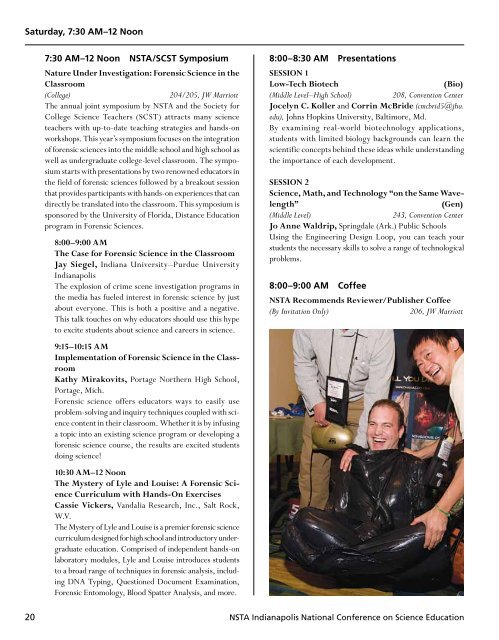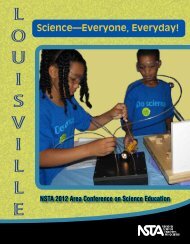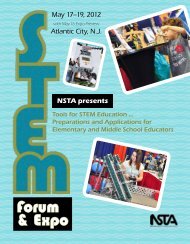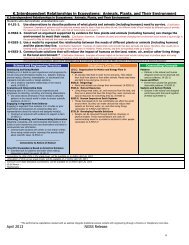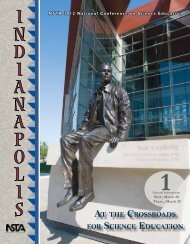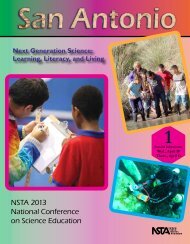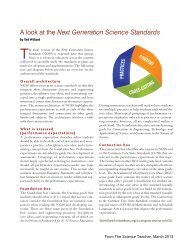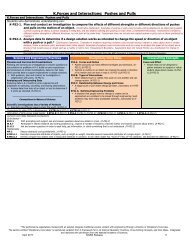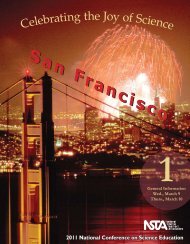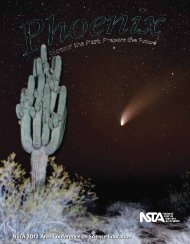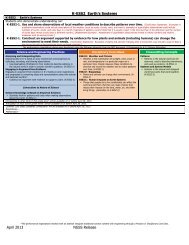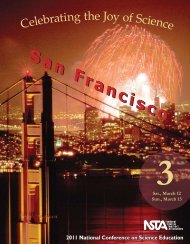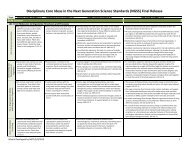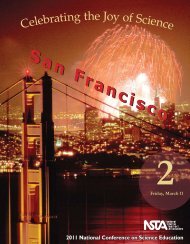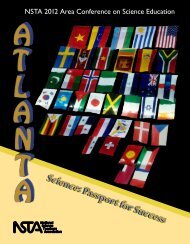Saturday/Sunday
Saturday/Sunday
Saturday/Sunday
Create successful ePaper yourself
Turn your PDF publications into a flip-book with our unique Google optimized e-Paper software.
<strong>Saturday</strong>, 7:30 AM–12 Noon<br />
7:30 AM–12 Noon NSTA/SCST Symposium<br />
Nature Under Investigation: Forensic Science in the<br />
Classroom<br />
(College)<br />
204/205, JW Marriott<br />
The annual joint symposium by NSTA and the Society for<br />
College Science Teachers (SCST) attracts many science<br />
teachers with up-to-date teaching strategies and hands-on<br />
workshops. This year’s symposium focuses on the integration<br />
of forensic sciences into the middle school and high school as<br />
well as undergraduate college-level classroom. The symposium<br />
starts with presentations by two renowned educators in<br />
the field of forensic sciences followed by a breakout session<br />
that provides participants with hands-on experiences that can<br />
directly be translated into the classroom. This symposium is<br />
sponsored by the University of Florida, Distance Education<br />
program in Forensic Sciences.<br />
8:00–9:00 AM<br />
The Case for Forensic Science in the Classroom<br />
Jay Siegel, Indiana University–Purdue University<br />
Indianapolis<br />
The explosion of crime scene investigation programs in<br />
the media has fueled interest in forensic science by just<br />
about everyone. This is both a positive and a negative.<br />
This talk touches on why educators should use this hype<br />
to excite students about science and careers in science.<br />
9:15–10:15 AM<br />
Implementation of Forensic Science in the Classroom<br />
Kathy Mirakovits, Portage Northern High School,<br />
Portage, Mich.<br />
Forensic science offers educators ways to easily use<br />
problem-solving and inquiry techniques coupled with science<br />
content in their classroom. Whether it is by infusing<br />
a topic into an existing science program or developing a<br />
forensic science course, the results are excited students<br />
doing science!<br />
10:30 AM–12 Noon<br />
The Mystery of Lyle and Louise: A Forensic Science<br />
Curriculum with Hands-On Exercises<br />
Cassie Vickers, Vandalia Research, Inc., Salt Rock,<br />
W.V.<br />
The Mystery of Lyle and Louise is a premier forensic science<br />
curriculum designed for high school and introductory undergraduate<br />
education. Comprised of independent hands-on<br />
laboratory modules, Lyle and Louise introduces students<br />
to a broad range of techniques in forensic analysis, including<br />
DNA Typing, Questioned Document Examination,<br />
Forensic Entomology, Blood Spatter Analysis, and more.<br />
8:00–8:30 AM Presentations<br />
SESSION 1<br />
Low-Tech Biotech<br />
(Bio)<br />
(Middle Level–High School) 208, Convention Center<br />
Jocelyn C. Koller and Corrin McBride (cmcbrid5@jhu.<br />
edu), Johns Hopkins University, Baltimore, Md.<br />
By examining real-world biotechnology applications,<br />
students with limited biology backgrounds can learn the<br />
scientific concepts behind these ideas while understanding<br />
the importance of each development.<br />
SESSION 2<br />
Science, Math, and Technology “on the Same Wavelength”<br />
(Gen)<br />
(Middle Level)<br />
243, Convention Center<br />
Jo Anne Waldrip, Springdale (Ark.) Public Schools<br />
Using the Engineering Design Loop, you can teach your<br />
students the necessary skills to solve a range of technological<br />
problems.<br />
8:00–9:00 AM Coffee<br />
NSTA Recommends Reviewer/Publisher Coffee<br />
(By Invitation Only)<br />
206, JW Marriott<br />
20 NSTA Indianapolis National Conference on Science Education


